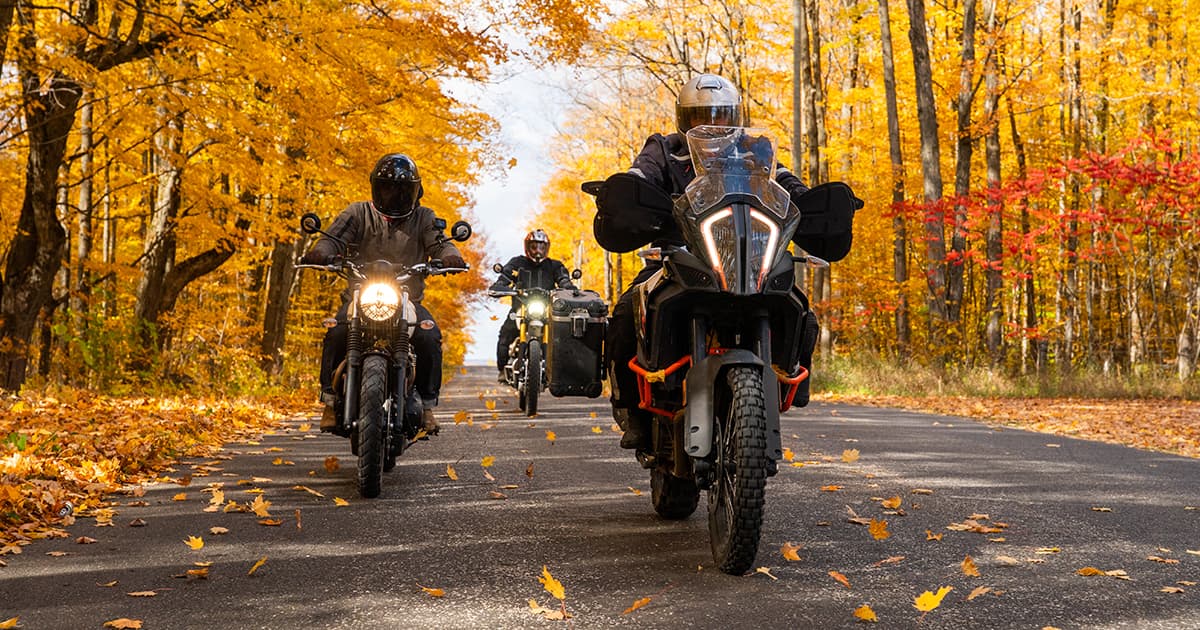Does Insurance Cover My Motorcycle and ATV During Winter?

For motorcycle, ATV, and scooter enthusiasts, it’s soon time to put your rides away for the winter.
These toys need proper storage and winterization to ensure when spring arrives you are ready to enjoy the season.
Proper seasonal vehicle storage is critical during the cold months when they are not in use. Motorcycle, ATV, and scooter insurance typically covers your vehicle year-round, including during the winter months when you're not riding it.
Here's a step-by-step guide on how to winterize your motorcycle, ATV, and scooter
Clean your vehicle: Wash your motorcycle, all-terrain vehicle (ATV), and scooter thoroughly to remove dirt, grime, and salt residue. Make sure they are completely dry.
Change the oil and filter: Replace the oil and oil filter. Fresh oil helps prevent corrosion during storage.
Fuel system:
• Add a fuel stabilizer to the gas tank to prevent fuel from deteriorating and clogging the carburetor or fuel injectors.
• Run the engine for a few minutes to ensure the stabilized fuel reaches the engine and carburetor.
Battery maintenance:
• Remove the battery from the vehicle. If you can't remove the battery, keep it connected to a battery tender or maintainer to prevent it from losing charge.
• Clean the battery terminals and apply a light coat of grease to prevent corrosion.
• Store the battery in a cool, dry place. Consider using a trickle charger to maintain its charge.
Tire care:
• Inflate the tires to the manufacturer's recommended pressure.
• Consider using a stand or paddock stand to keep the tires off the ground and prevent flat spots.
Storage location:
• Store your vehicle in a dry, cool, and well-ventilated location. such as a garage or shed.
• If possible, cover it with a breathable motorcycle cover to protect it from dust and moisture.
Exhaust and intake:
• Stuff a clean cloth or paper towel into the exhaust pipe to prevent critters from making a home there.
• Cover the air intake with a breathable material to keep out debris.
Chain and drive: Lubricate the chain to prevent rust.
Cooling System: Check the coolant levels and ensure it's appropriate for winter temperatures.
Brake and clutch fluid: Check the brake and clutch fluid levels and top up if necessary.
documentation: Ensure your vehicle's registration, insurance, and any required permits are up to date.
Scheduled maintenance: If your vehicle is due for any scheduled maintenance or repairs, it's a good idea to address them before winterizing.
Safety check: Check all lights, signals, and brakes to ensure they're working correctly.
Record keeping: Maintain a record of the steps you've taken for winterization and any maintenance performed.
Regular checkups: Periodically inspect your vehicle during the winter months to ensure it's in good condition.
When spring arrives, follow the reverse process to prepare your vehicle for riding season. Proper winterization will help extend the life of your vehicle and ensure it's in top condition when you're ready to hit the road again.
Insurance Coverage
Motorcycle, ATV, and scooter insurance typically covers your vehicle year-round, including during the winter months when you're not riding it. However, there are a few important points to keep in mind:
Coverage Type: The extent of coverage can vary depending on the type of insurance you have. The most common types of coverage include liability, collision, comprehensive, and uninsured/underinsured motorist coverage.
Year-Round Coverage: Motorcycle insurance policies are typically continuous throughout the year unless you specifically request a seasonal policy. Most riders prefer to keep their coverage active year-round to protect against theft, vandalism, and other risks that can occur even when the motorcycle is not in use.
Storage Considerations: If you plan to store your motorcycle, ATV, scooter for an extended period during the winter and will not be riding it at all, you may be able to adjust your insurance coverage to reflect the reduced risk. This is often referred to as "lay-up" coverage. During this time, you may reduce your coverage to only comprehensive, which protects against non-collision-related damage, like theft and damage from natural disasters.
Western Financial Group offers a complete set of insurance products and solutions through our licensed sales brokers who are located across Canada. Car, home, many types of recreational vehicles and commercial/business insurance.



